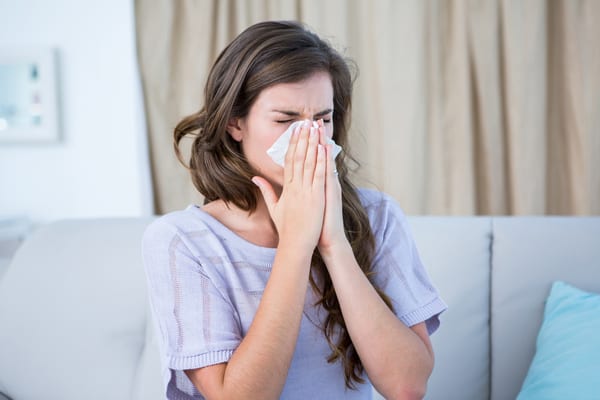
Climate change is impacting the pollen season in the UK (Photo: Shutterstock)
Hay fever is usually associated with the warmer months but some people may already be experiencing the symptoms.
Recent studies have found that climate change is resulting in some types of pollen, which trigger hay fever, being released earlier in the year in the UK. As a result, some people could be suffering from hay fever as early as January or February.
Here’s what we know about whether it’s possible to get hay fever in the winter months:
Is it possible to get hay fever in February?
Hay fever, which has cold-like symptoms, is caused by an allergic reaction to various types of pollen or fungal spores. The most common cause of hay fever is grass, followed by birch and oak, but there are many other triggers, including moulds and weeds.
The most common sources of hay fever tend to produce pollen from spring onwards, but some people are allergic to early flowering trees, such as hazel and alder, which start producing pollen from January.
These people can start feeling the symptoms of hay fever from the beginning of the year.
Earlier pollen seasons can also be triggered by unusual weather patterns.
Dr Beverley Adams-Groom, a senior palynologist and pollen forecaster at the University of Worcester, which produces the UK’s pollen forecast, said the alder tree pollen season is “getting earlier and is getting more severe”.
“The season started getting earlier around 2011 and is now occurring, on average, up to a week earlier than it was then. This is most likely in response to climate change.”
Stephen Dixon, a spokesperson for the Met Office, added: “It is possible to get some hay fever symptoms in the UK in February, though you need the right mix of meteorological conditions through winter to make it possible.”
Rain, wind, temperature and sunshine – and combinations of these factors – can affect pollen count.
Is climate change impacting the pollen season?
While it is still fairly unusual to experience hay fever symptoms in winter, Mr Dixon said a “changing climate will mean that changes in temperature and rainfall may lengthen the UK pollen season”.
A number of recent studies have suggested that rising temperatures are resulting in some types of pollen being released earlier in the year, meaning more people could start feeling the symptoms of hay fever in the winter months.
A study released in 2022 by the University of Worcester used data from six pollen stations around the country between 1995 and 2020 and found a mixed picture on how climate change has affected various types of pollen.
It found warmer weather has caused the oak pollen season to start earlier in the spring. The birch season was not found to start earlier, but was becoming more severe as hotter temperatures caused birch trees to produce more pollen. Grass pollen was less affected, but the study found there is a trend towards an earlier ‘first high day’, which is the first day that pollen levels reach the ‘high’ threshold.
Meanwhile, a new 52-year analysis published in collaboration between the UK Health Security Agency (UKHSA) and academics earlier this year, found some types of pollen and other allergens were being released earlier in the year and for longer durations due to higher temperatures. For some types of pollen, such as grass and oak, this could trigger hay fever as early as January or February, according to the UKHSA.
Mr Dixon said another factor to consider is that climate change “could introduce more invasive species which release pollen” to the UK that “could affect those with hay fever”.
What is the current pollen count in the UK?
The University of Worcester provides a weekly pollen forecast for the UK in conjunction with the Met Office.
For the week covering 21 February to 1 March, the tree pollen count and fungal spore levels were moderate, while the weed and grass pollen counts were low.
People do not typically start experiencing hay fever symptoms until pollen counts are high.
News Related-
Pedestrian in his 70s dies after being struck by a lorry in Co Laois
-
Vermont shooting updates: Burlington police reveal suspect’s eerie reaction to arrest
-
Grace Dent says her ‘heart is broken’ as she exits I’m A Celebrity early
-
Stromer’s ST3 Urban E-Bike Goes Fancy With Minimalist Design, Modern Tech
-
Under-pressure Justice Minister announces review of the use of force for gardaí
-
My appearance has changed because of ageing, says Jennifer Lawrence
-
Man allegedly stabbed in the head during row in Co Wexford direct provision centre
-
Children escape without injury after petrol bomb allegedly thrown at house in Cork City
-
Wexford gardai investigating assault as man is bitten in the face during Main Street altercation
-
Child minder’s husband handed eight year sentence for abusing two children
-
The full list of the best London restaurants, cafes and takeaways revealed at the Good Food Awards
-
Mazda CEO Says EVs 'Not Taking Off' In The U.S.—Except Teslas
-
Leitrim locals set up checkpoint to deter asylum seekers
-
Ask A Doctor: Can You Get Shingles More Than Once?
